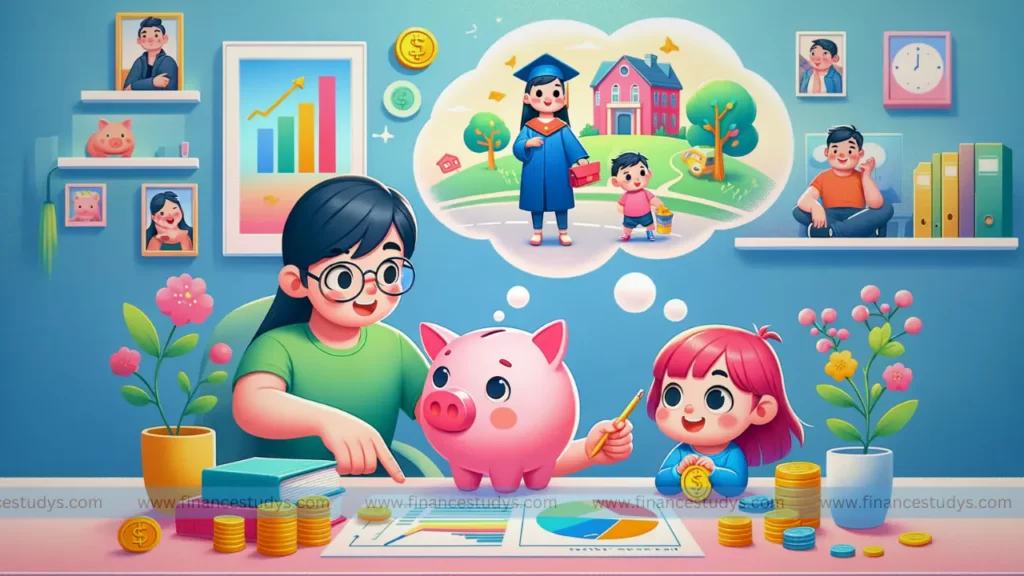In today’s world where instant gratification often reigns supreme equipping children with a strong foundation in personal finance might seem like a secondary concern.
However, the reality is that personal finance skills are crucial for building responsible empowered individuals and their importance in child development cannot be overstated.
Just like teaching children to brush their teeth or say “please” incorporating age appropriate financial literacy into their upbringing offers immense benefits that extend far beyond managing money.
Here are 10 compelling reasons why personal finance is the important secret weapon for raising a responsible empowered child future:
Fosters Responsibility and Decision-Making:
From understanding the value of a dollar to making informed choices about spending, learning about personal finance teaches children to be accountable for their actions. They begin to grasp the consequences of choices, whether it’s choosing to save for a desired toy or prioritizing needs over wants.
This sense of responsibility spills over into other areas of their lives, making them more mindful and thoughtful decision-makers.
Boosts Confidence and Self-Esteem:
Managing money effectively invests a sense of accomplishment and pride in children. Hitting a savings goal, making a smart purchase, or even helping with budgeting shows them their capabilities and fosters a belief in their ability to achieve financial security.
This newfound confidence spills over into other aspects of their lives, allowing them to tackle challenges with optimism and self-assuredness.
Promotes Goal Setting and Planning:

Whether it’s a new video game, a dream vacation, or a college education, children are constantly bombarded with desires. Personal finance education teaches them the importance of setting realistic goals, planning accordingly, and delaying gratification when necessary.
This valuable skill equips them to navigate not just their finances but also their academic, career, and personal aspirations.
Encourages Entrepreneurship and Innovation:
Understanding basic financial concepts like budgeting, saving, and investing opens doors to entrepreneurial thinking. Children learn to identify opportunities, manage resources, and take calculated risks, all critical skills for future success in any field.
This fosters a spirit of innovation and problem-solving that can benefit them throughout their lives, regardless of their chosen path.
Builds Communication and Collaboration Skills:
Money matters are rarely isolated; they often involve discussions and decisions within families. Talking openly about personal finance with children encourages open communication and collaboration.
Children learn to express their needs and desires, negotiate solutions, and compromise, laying the foundation for healthy relationships and effective teamwork in all aspects of life.
Cultivates Critical Thinking and Problem-Solving:
Personal finance isn’t just about numbers; it’s about analyzing situations, weighing options, and making informed choices. From comparing prices to budgeting for unexpected expenses, children practice critical thinking and problem-solving skills with real-world consequences.
This equips them to handle challenges and make sound decisions not just in financial matters but also in other areas of life.
Creates a Sense of Security and Stability:
Understanding personal finance helps children feel more secure and prepared for the future. Knowing they have the skills and knowledge to manage their finances responsibly reduces anxiety and allows them to focus on pursuing their dreams.
This sense of security and stability lays the groundwork for a happy and fulfilling life.
Encourages Empathy and Financial Responsibility:
Discussing concepts like budgeting, saving, and responsible spending opens children’s eyes to the realities of the world. They learn about the value of hard work, the importance of living within their means, and the consequences of financial decisions.
This fosters empathy and understanding for others, encouraging them to become responsible and contributing members of society.
Develops Resilience and Adaptability:
Life is full of unexpected twists and turns, and finances are no exception. Learning about personal finance prepares children for the inevitable ups and downs of financial reality.
They develop resilience, learn to adapt to changing circumstances, and make informed decisions even when faced with challenges. This equips them to navigate the complexities of life with confidence and flexibility.
Creates a Strong Family Foundation:
Open and honest discussions about personal finance strengthen family bonds and communication. Talking about budgets, goals, and spending habits together fosters trust, transparency, and collaboration.
This shared understanding creates a supportive environment where children feel empowered to ask questions, seek guidance, and make responsible financial decisions in a safe and nurturing space.
Conclusion
In summary, teaching personal finance to children is a vital part of their development. It’s not just about money management, but about shaping responsible, confident, and innovative individuals. Learning about finances helps kids understand the value of money, make better decisions, and develop a sense of responsibility.
It boosts their confidence and self-esteem, teaching them to set and achieve goals. Financial education also encourages creative thinking and problem-solving, essential skills for success in any field. It improves their communication and collaboration abilities, making them more empathetic and aware of others. Most importantly, it prepares them for life’s uncertainties, fostering resilience and adaptability. Lastly, discussing finances within the family strengthens trust and togetherness, creating a supportive environment for kids to grow and thrive.

